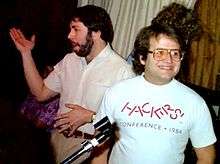Andy Hertzfeld
| Andy Hertzfeld | |
|---|---|
 Hertzfeld (right) and Steve Wozniak at an Apple Computer Users Group meeting in 1985 | |
| Born |
April 6, 1953 Philadelphia, Pennsylvania, U.S. |
| Nationality | American |
| Alma mater | |
| Occupation | Computer scientist |
| Known for | co-creation of original Macintosh computer |
| Spouse(s) | Joyce McClure (m. 1998) |
| Website | http://www.folklore.org/ |
Andy Hertzfeld (born April 6, 1953) is an American computer scientist and inventor who was a member of the original Apple Macintosh development team during the 1980s. After buying an Apple II in January 1978, he went to work for Apple Computer from August 1979 until March 1984, where he was a designer for the Macintosh system software. Since leaving Apple, he has co-founded three companies: Radius in 1986, General Magic in 1990 and Eazel in 1999. In 2002, he helped Mitch Kapor promote open source software with the Open Source Applications Foundation. Hertzfeld joined Google in 2005, and in 2011 was the key designer of the Circles user interface in Google+.
Apple Computer (1979–1984)
After graduating from Brown University with a Computer Science degree in 1975, Hertzfeld attended graduate school at the University of California, Berkeley. In 1978, he bought an Apple II computer and soon began developing software for it. He was hired by Apple Computer as a systems programmer in 1979 and developed the Apple SilenType printer firmware and wrote the firmware[1] for the Sup'R'Terminal, the first 80-column card for the Apple II. In the early 1980s, he invited his high school friend, artist Susan Kare, to join Apple in order to help design what would become standard Macintosh icons.
Hertzfeld was a member of the Apple Macintosh design team.[2][3] After a shakeup in the Apple II team and at Hertzfeld's request, Apple co-founder Steve Jobs added him to the nearly two-year-old team in February 1981. Working for Bud Tribble alongside Bill Atkinson and Burrell Smith, Hertzfeld became a primary software architect of the Macintosh Operating System, which was considered revolutionary in its use of the graphical user interface (GUI) where Jef Raskin also made contributions.
Hertzfeld's business card at Apple listed his title as Software Wizard.[4] He wrote large portions of the Macintosh's original system software, including much of the ROM code, the User Interface Toolbox, and a number of innovative components now standard in many graphic user interfaces, like the Control Panel and Scrapbook.
After Apple (1984–present)
Since leaving Apple in 1984, Hertzfeld has co-founded three new companies — Radius (1986), General Magic (1990) and Eazel (1999). At Eazel, he helped to create the Nautilus file manager for Linux's GNOME desktop. He volunteered for the Open Source Applications Foundation in 2002 and 2003, writing early prototypes of Chandler, their information manager. In 1996, Hertzfeld was interviewed by Robert Cringely on the television documentary Triumph of the Nerds, and was again interviewed by Cringely on NerdTV in 2005.
In early 2004, he started folklore.org, a Web site devoted to collective storytelling that contains dozens of anecdotes about the development of the original Macintosh. The stories have been collected in an O'Reilly book, Revolution in the Valley, published in December 2004. In August 2005, Hertzfeld joined Google.[5]
On June 28, 2011, Google announced Google+, its latest attempt at social networking. Hertzfeld was the key designer of the Google+ Circles component user interface, but not the entire project as has been mistakenly claimed.[6][7]
Hertzfeld was portrayed by Elden Henson in the 2013 film Jobs,[8] and by Michael Stuhlbarg in the 2015 film Steve Jobs.[9]
References
- ↑ M&R Enterprises, Sup'R'Terminal Manual, page 47, 1980.
- ↑ Hertzfeld, Andy (February 1984). "Macintosh System Software Overview". BYTE. p. 38. Retrieved 22 October 2013.
- ↑ Lemmons, Phil (February 1984). "An Interview: The Macintosh Design Team". BYTE (interview). p. 58. Retrieved 22 October 2013.
- ↑ Diaz, Jesus. "How Steve Jobs Caused the Funniest and Weirdest Apple Business Card I've Ever Seen". Gizmodo. Retrieved 2016-03-14.
- ↑ Markoff, John (August 22, 2005). "Where Does Google Plan to Spend $4 Billion?". The New York Times. Retrieved April 25, 2010.
- ↑ Levy, Steven. Inside Google+ — How the Search Giant Plans to Go Social. Wired. June 28, 2011.
- ↑ Google+ post by Herzfeld
- ↑ "Thesps click with Steve 'Jobs' indie: Kevin Dunn, Elden Henson, others join biopic". tribunedigital-chicagotribune. Retrieved 2016-03-14.
- ↑ Merry, Stephanie (2015-10-16). "Aaron Sorkin doesn't want people calling the Steve Jobs biopic a biopic". The Washington Post. ISSN 0190-8286. Retrieved 2016-03-14.
- Hertzfeld, Andy (2004). Revolution in the Valley. O'Reilly Books. ISBN 0-596-00719-1.
- Deutschman, Alan (2000). The Second Coming of Steve Jobs. Broadway Books. ISBN 0-7679-0433-8.
External links
| Wikimedia Commons has media related to Andy Hertzfeld. |
- Differnet.com — Andy Hertzfeld's personal homepage; a collection of Web sites designed and/or hosted by him
- Revolution in the Valley Andy Hertzfeld's book about the development of the Macintosh.
- Folklore.org — Macintosh Folklore, a Web site that contains all of the stories in the book, and more
- NerdTV interview (September 2005) with Hertzfeld by PBS's Robert X. Cringely, available in audio, video, and text transcript
- ITConversations Dr. Moira Gunn speaks with Andy Hertzfeld
- John Wants Answers Interview with Andy Hertzfeld along with Steve Wozniak and Daniel Kottke about the biopic Jobs.